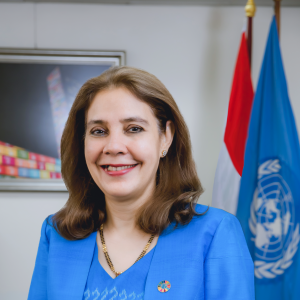Your Excellency Professor Bambang Susantono, Chairman, Nusantara Capital Authority, Republic of Indonesia
Bapak and Ibu, Representatives from Provincial and District Governments, Civil Society Organizations, Private Sectors and Academia.
Selamat Pagi.
Let me express my gratitude to the National Capital Authority for inviting the UN to join this consultation in the new capital Nusantara.
Saya baru tiba di Indonesia (I am new to the country) and my first trip outside Jakarta brings me to the island of Kalimantan.
Nusantara is a testimony of Indonesia’s ambition to take national development to the next level.
Pak Bambang, let me congratulate you and OIKN for the first-ever Voluntary Local Review for a new capital city.
This is path breaking as it will set a global precedence for cities aiming to be carbon neutral and achieve positive gains for biodiversity backed by smart, accessible, and sustainable infrastructure.
It will be a city that localises SDGs!
The VLR establishes the baseline and sets out the pathway to achieve SDGs while recognising the risks and challenges that need to be addressed.
The co-creation of the VLR brings stakeholders together to galvanize locally led actions to effect meaningful progress towards for SDGs.
Pak Bambang, you led consultations in Jakarta and Balikpapan previously dan hari ini kita berada di Nusantara (and today we are in Nusantara) for the same purpose.
The voices of local communities matter and we stand committed to sustain and widen public participation.
This will promote transparency and build trust by providing clarity on how the city’s development aligns with the SDGs and local aspirations.
Allow me to highlight three aspects of the VLRs.
First, Nusantara is expected to reduce poverty, increase access to basic services, and bring infrastructure investments across the districts.
The private sector, partnering with the UN Global Compact Network, will be critical to supporting this transformation by prioritizing clean industries, sustainable agriculture, ecotourism, and renewable energy.
This will create employment and green jobs for local communities while serving as a driver for sustainable and inclusive growth.
Second, Nusantara aims to become a “sustainable forest city” with 65% of tropical forests restored in the capital region.
The commitment to greening the environment will eliminate deforestation and conserve ecosystems.
This will require closer engagement with local communities, especially in biodiverse buffer zones.
This will position Nusantara as a net carbon sink by 2030 in forest and other land use sector in line with the city’s Biodiversity Management Masterplan.
Third, VLRs recommend bolstering gender equality while prioritizing social inclusion to ensure women, young people, elderly and people with disabilities benefit from development programs and children thrive in a child-friendly city.
To that end, the UNDP-led foresight exercise seeks to understand the needs and ambitions of local communities.
One emerging lesson is that public spaces need to be accessible, accommodate daily activities and support the preservation of local culture.
Pak Bambang, the UN’s engagement with Nusantara will remain robust with the High-Level Political Forum in New York serving as a platform to showcase Nusantara’s VLR at the global stage.
ESCAP, UNDP, UNIDO, UNHABITAT, and UNICEF will continue to bring to bear their expertise to support Nusantara’s green transformation.
Bapak dan Ibu, inilah kesempatan untuk menyampaikan pendapat (this is your opportunity to share your views) dan saya sudah tidak sabar lagi untuk mendengarnya (and we look forward to hearing from you all).
Terima Kasih
---------------------
The full speech can also be downloaded, here.













